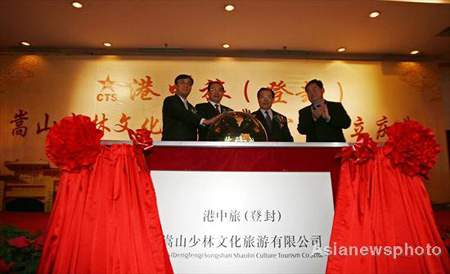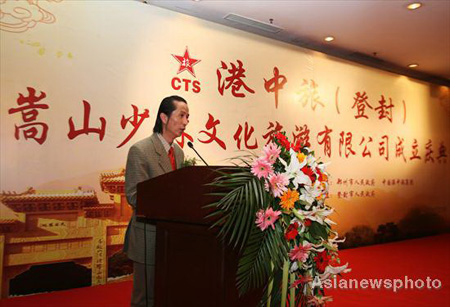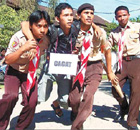Society
New firm set up to promote Shaolin culture in Henan
(Xinhua)
Updated: 2009-12-28 11:29
 |
Large Medium Small |
|
 Wang Wenchao (L2), secretary of Zhengzhou municipal Party Commitee, launches the unveiling ceremony of the new company CTS (Dengfeng) Songshan Shaolin Culture Tourism Co Ltd with Zhang Xuewu (L3),chairman of China National Travel Service (HK) Group Corporation on December 27, 2009.[Asianewsphoto] |
ZHENGZHOU: A new company was set up Sunday to promote the culture of the world-famous Shaolin Temple in central China's Henan Province and the tourism of Songshan Mountain, home to the 1,500-year-old temple.
The CTS (Dengfeng) Songshan Shaolin Culture Tourism Co. Ltd. was established as a joint venture between the Dengfeng Songshan Shaolin Culture Tourism Group Co. Ltd., which is owned by the Dengfeng city government in Henan, and the Hong Kong-based China Travel International Investment Hong Kong Limited, a subsidiary of the state-owned China National Travel Service (HK) Group Corporation (HKCTS).
The Hong Kong company takes a 51-percent stake and the Dengfeng company holds 49 percent of the new joint venture, which has a registered capital of 100 million yuan (US$14.7 million).
"In the next 10 years, we will greatly promote the tourism of the Songshan Mountain scenic spot, improve the infrastructure and upgrade the services," said Bo Baohua, board chairman of the new company, at an inauguration ceremony held in Zhengzhou, capital of Henan.
|
|
"Meanwhile, we will greatly promote the Shaolin kungfu and culture," he said.
CONTROVERSY ENDED
The new joint venture had come under spotlight as earlier reports said the government of Dengfeng, where the Shaolin Temple lies, was trying to have the religious place listed in the stock market.
The reports had sparked criticism on the Dengfeng government, as critics say it was selling state assets at a low price and the agreement would hurt the feelings of Shaolin monks and religious people.
But the Dengfeng government had denied the reports in a statement earlier this month, saying "16 cultural relics of national and provincial levels, including the Shaolin Temple, in the area will not be managed by the new joint venture".
Xu Muhan, vice general manager of the HKCTS, also refuted the reports Sunday.
"The shares that our company holds are of the Songshan Mountain scenic spot, which does not include the Shaolin Temple," he told reporters.
"Meanwhile, HKCTS itself is a state-owned company, so such an issue does not exist about selling state assets at a low price," he said.
"In addition, we will protect the cultural heritage and religious places in tourism development," he added.
The Shaolin Temple, built 1500 years ago during the Wei and Jin Dynasties, is famous for Buddhist teaching and Chinese martial arts, particularly Shaolin kungfu.
Shaolin, which has become a household name around the world, has developed business operations such as kungfu shows, film production and online sales under the leadership of Shi Yongxin.
Shi Yongxin has also earned himself the nickname the "CEO monk" since he officially took over as abbot in 1999.
However, he had repeatedly pledged that "Shaolin Temple was not an enterprise, its value was beyond measurement, and it is never to be listed."
He has submitted proposals several times to the national legislature, suggesting the exemption of entrance fees at religious tourist attractions to promote cultural protection.
Shi was absent from Sunday's inauguration ceremony, although he had been invited by the organizer.














